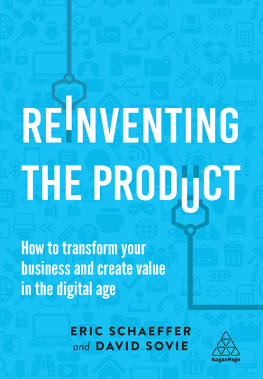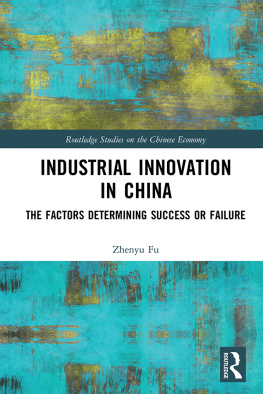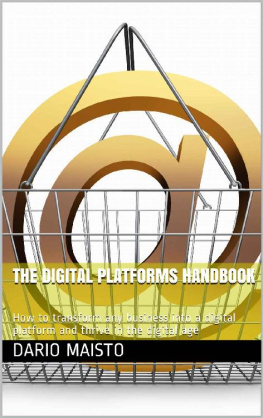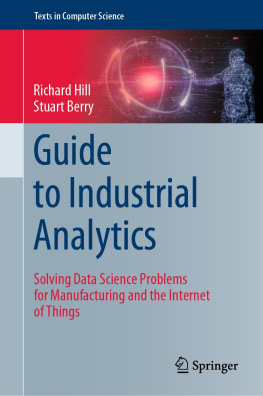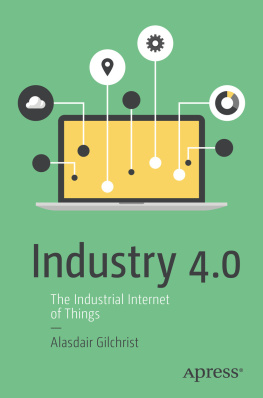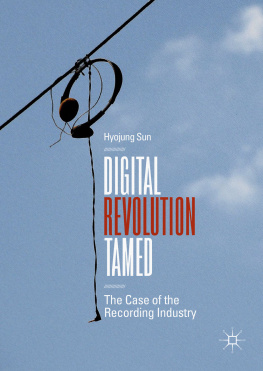Industry X.0
Realizing Digital Value in Industrial Sectors
Eric Schaeffer

Tabel of Contents
List of Pages
Guide
The world has become digitally connected to the point of no return. Each day around five million devices become linked up with either each other, the Internet or both. There are around 6.4bn data-communicating objects in the world and by 2020 this number is forecast to explode to around 20bn. Our digital universe is in healthy expansion mode.
From this perspective, todays device boom the wristband pulse monitors, smart watches, satnavs and intelligent thermostats are just the overture to a long and eventful journey towards lives digitally augmented, supported and enabled in ways unlike anything humans have ever experienced before.
The advance is propelled by our craving for technical innovation and our tendency to adapt promptly to new ways of interacting and engaging with machines and devices as soon as they exist. We as consumers will keep asking why this or that gap in the market has not yet been filled by some device or software solution. Businesses the focus of this book, hence the title Industry X.0 and their increasingly digitally native workforce, used to a highly digitized private lifestyle, will put the same kinds of questions to their industrial vendors, displaying a new form of industrial consumerism.
At the core of this seismic upheaval sit Living Products, physical products reinvented as software-intelligent devices that act, think, and are closely and constantly aligned with their users and ecosystems.
Clearly, then, the industrial sphere, the sphere of technologically produced physical objects, will play a major part in the seminal trip towards the planets digitization. Digital technologies will create a stage on which we as public, businesses and industry experts will pull off spectacular things in the coming years.
Consider the following: the first pharmacy staffed only by robots, is expected to open its doors in 2021; Cars, industrial machinery and tooling, pumps, circuit breakers they can all be rendered Living Products by adding software intelligence.
The ship has clearly sailed for digital sceptics, both as citizens and business leaders. The industrial enterprise world, comprising two thirds of the worlds gross domestic product, will be changed beyond recognition by digital technology, disrupting decades-old business habits, conventions and operating models. The ways in which labor works, machine-based processes are organized and information is shared will be turned on their heads. Strategic corporate thinking will be forced to incorporate completely new data-driven business models to secure a future for any enterprise. No wonder the US, Germany, China and Japan all strongholds of successful industrial enterprises have, with varying focus, put industrial digital transformation high on the agenda.
There is no turning back. What matters now is to make the most of the digital transformation. We have the opportunity to shape it. There is not one standard way to make it happen, the journey must be tailored to each enterprise individually.
That is why this book, unlike other publications, not only addresses the why of the industrial spheres wholesale digitization but also, primarily, the how, examining in detail the steps industrial businesses need to take to get the greatest positive effect and value from digital.
Packed with easily accessible actionable insights and suggestions, it should be a vital resource for industrial business leaders at all levels, C-suite and below as well as across all functions. It should help them discover, think through, adopt and implement the roadmap necessary for their enterprises to head out for the new territory, and act as an aide-memoire as the journey progresses.
In this book I have managed to gather and shape forward-looking advice around a complex subject: the emergence of the Industrial Internet of Things (IIoT) and its transformation of the industrial sectors. I visited and revisited the topic in detail and assessed its ramifications for the enterprises affected. And I developed a good deal of thought leadership in the process.
All this would have been impossible without the input of a large number of knowledgeable people from beyond our core book team. I was fortunate to be able to tap a wide intellectual catchment area: corporate thinkers, co-consultants, and clients, based in the US, UK, Germany, France, Italy, Korea, Europe, Japan, and China, contributing either broad ideas that helped shape the general themes and scope of the book or practical industry experience, focused sector insights, and firm opinion to test our own thinking. Their input has been invaluable in shaping the books observations, analyses and hypotheses.
To all of them I would like to express a sincere Thank you. The support of every one of you individually was a conditio sine qua non for pulling this off and collectively represents a piece of vanguard consultancy thinking on what is currently one of the most pressing subjects in the business world.
At Accenture I wish to thank David Abood, Fabian Bohn, Christophe Brasselet, Jean Cabanes, Brian Doyle, Dan Elron, Andreas Gissler, AJ Gupta, Francis Hintermann, Richard Holman, Venkatesh Iyer, Lisa-Cheng Jackson, Jitendra A. Kavathekar, Shinichiro Kohno, Bodo Krber, Guiseppe La Commare, JC Ledoux, Sebastien Lepicard, Mahesh Mahajan, Sarat Maitin, Brian May, Bruno le Moal, Eric Mokrenski, Massimo Pagella, Mark H. Pearson, Bruno Pfeiffer, Philippe Pruvost, Kevin Prendeville, Kausar Qazilbash, Wu Qi, Aidan Quilligan, Ganesan Ramachandran, Shugo Sohma, Ben Salama, Marcello Tamietti, Maxence Tilliette, Cedric Vatier, Patrick Vollmer, Ben Wang, and Will Zhang.
Special thanks must go to Sander van t Noordende, Omar Abbosh, and Frank Riemensperger for their support, inspiration and thought leadership around the transformation of industries.
Within Accenture thanks are also owed to Georg Berger, Gemma Catchpole, Andreas Egetenmeyer, Sonja Fink, Ulf Henning, Fiona Morris and Matthias Wahrendorff, the closer team steering the publication, as well as to Jens Schadendorf, Titus Kroder, and John Moseley, who brought valuable experience and exceptional knowledge with regard to the writing and publishing of a book.
A big thank you also goes to Helen Kogan and Jenny Volich from Kogan Page, and Michael Wurster from Redline, as the publishers of this book, for their enduring commitment to and trust in this project.
Finally, and above all, I thank my wife Pascale for her patience, relentless support and love and my children William, Meryl and Edouard for the many and passionate discussions on the new digital economy. May this book help them navigate successfully through the change.
Coinciding with the wholesale digital interlinking of society, the digital disruption and transformation of the industrial sphere is one of the worlds current megatrends, affecting companies representing two thirds of global GDP. Makers of cars, planes, trains, domestic appliances, heavy equipment and engineering technology, pharmaceuticals, and utility and raw materials businesses are all undergoing waves of technological upheaval as we speak.
Smartened, tightly connected, data-driven industrial products and processes are going to go mainstream in all advanced and many emerging countries very soon. Embedded in the wider trend towards the Internet of Things (IoT), its sub-segment, the Industrial Internet of Things (IIoT), will digitally orchestrate factory floors, physical products, workers and all enterprise functions and processes, unleashing enormous value potential.


